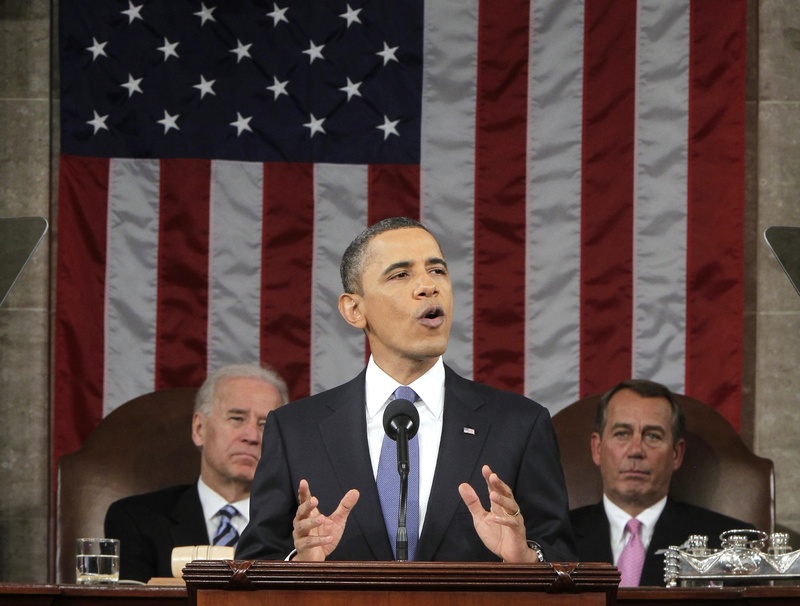It was a speech, if not for the ages, then certainly for the moment.
Our “Sputnik moment,” President Obama called it in his State of the Union address – and for those who don’t remember Sputnik, it was a Soviet satellite that became a symbol of America’s capacity to snatch victory from the jaws of defeat.
“Half a century ago, when the Soviets beat us into space with the launch of a satellite called Sputnik, we had no idea how we would beat them to the moon,” the president recalled. “The science wasn’t even there yet. NASA didn’t exist. But after investing in better research and education, we didn’t just surpass the Soviets; we unleashed a wave of innovation that created new industries and millions of new jobs.”
The urgency of defeating the Soviet Union in the space race was about far more than space exploration. It was about maintaining and advancing the United States’ pre-eminent position as the most powerful nation on Earth. Obama argued in his speech Tuesday night – and he was right – that our country faces an equally urgent challenge today.
As our economy struggles to rebound from the worst recession since the Great Depression and our citizens yearn for a time in our not-so-distant past when jobs were plentiful, the president stepped to the plate and hit a rhetorical home run. The speech was uplifting and forward-looking, eloquent but restrained. There was no hint of showboating oratory, no mind-numbing laundry list of policy proposals, no emotional excessiveness contrived to put lumps in our throats.
VISION ARTICULATED
Obama succinctly laid out the challenge and articulated a vision to address it.
Pundits promptly dismissed the theme of the speech, “winning the future,” as a slogan geared to the next round of political posturing in a country where posturing has become the preferred alternative to meaningful discussion of issues. It will make a good slogan, but it was more than that. The president was declaring that the future begins now, that whatever differences of opinion and philosophy have paralyzed us in the past can and must be put aside for the common good.
Time was, the United States owned the free-market economy. We had the best products, the most productive workers, the best ideas, the newest inventions. The world followed our lead and envied our prosperity. But, as the president noted, the world has changed.
Today’s markets send capital to the countries where innovation, infrastructure and capacity for growth is the greatest. America can be that place. But it won’t be if we retreat, if we wait for positive change to happen on its own.
To compete with the emerging economies of countries such as India and China, we must match their commitment to investing in education, infrastructure and technology, to producing a work force capable of filling the demanding jobs of the future.
“We need to out-innovate, out-educate, and out-build the rest of the world,” Obama said. “We have to make America the best place on Earth to do business. We need to take responsibility for our deficit and reform our government. That’s how our people will prosper.”
Ah, yes. The deficit. The president called for investment in high-speed rail, high-speed Internet, pure research and clean energy technology. He didn’t say what all this will cost, or exactly how we will pay for it. Republicans replied to the Democratic president’s ambitious agenda by saying “investment” is just another word for “spending.”
CUTS WON’T DO IT
To hear the two Republican members of Congress who responded to Obama’s speech tell it, all we have to do to get the country moving again is to stop spending and pay down our debt.
The accumulating national debt, soon to be worsened by an impending budget deficit estimated at nearly $1.5 trillion, is a crisis that must be addressed. But obsessing about the debt at the expense of long-term competitiveness is self-defeating.
Republicans seem to believe that the only mandate flowing from their victories at the polls last November was to shrink government and cut spending. But many voters’ desire for change was driven by disgust with a power structure that simply wasn’t doing anything to address the problems and concerns of the country.
The president offered a plan of action. He will produce a budget next month, but spending bills originate in the Republican-controlled House of Representatives.
Democrats control the Senate, but by too small a margin to push anything through without significant Republican support. If they want to, Republicans can slam the brakes on any or all of the president’s initiatives.
That would be a horrible mistake. Some of the president’s ideas may not be viable, or may be too expensive. But the two parties need to work together to find a reasonable balance between progress and fiscal restraint. It’s what the people want.
And it is, to borrow a phrase, the only way to win the future.
Send questions/comments to the editors.



Comments are no longer available on this story